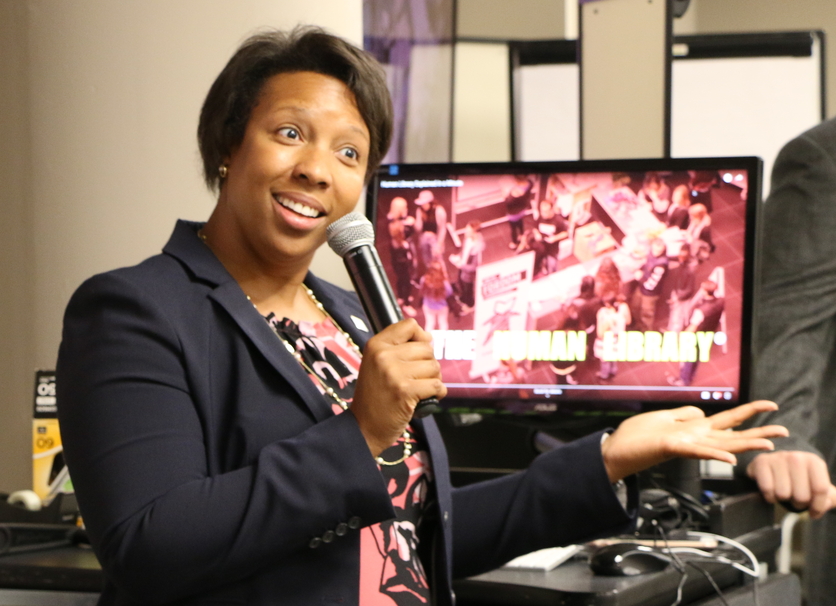
Oakland University William Beaumont School of Medicine’s Diversity Lecture Series continued this month with the return of Caryn Reed-Hendon, Ph.D. — the school’s former director of Diversity & Inclusion.
“Compassion: The Essential Element in Patient Care,” was the title of the event held virtually on Feb. 1 with more than 30 attendees.
The discussion centered around the necessity of compassion within health care in order to build trust between providers and their patients, and how cultural humility, community knowledge, belonging, and lived experiences play roles in showing compassion.
“Belonging is to patient care as air is to breathing. It is necessary,” said Reed-Hendon. “When we’re thinking about belonging — to feel safe, to feel valued, to feel heard in the space that you occupy —you have to think about the place in which that is happening.”
In order to foster belonging in the health care realm, said Reed-Hendon, physicians must listen to their patients closely to ensure they aren’t defaulting to an “easy fix” based on assumptions.
Physicians, she said, must also be conscious of providing “culturally-centered care,” or exhibiting cultural humility as well as having knowledge of cultural safety to understand where each individual person is coming from based on their background to provide a safe place for them to exist.
“When we’re looking at our hospital systems, we hope for them to have what’s called structural competence,” Reed-Hendon added.
“That means that they have the trained ability to discern how to deal with the host of issues that show up because of the impact of inequities within a system.”
In order to display this cultural humility and cultural safety, physicians must learn to address their implicit biases, said Reed-Hendon.
“Implicit bias often modifies the relationship between you and your teammates, as well as your patient. It absolutely can decrease trust, self-efficacy, understanding, and job satisfaction,” she said.
To address this, she said, people must be conscious of themselves and their surroundings and learning over time.
“It’s not until you’ve had repeated and differing experiences that you can begin to see how bias tends to show up. So when we don’t call it out, when we don’t say something when we see something…we don’t know how to treat people, from an interpersonal perspective,” said Reed-Hendon. “We are unable to actually communicate well with the patient that we’re helping…we will default to the easy fix.”
A ‘full circle’ moment
Reed-Hendon left her position at OUWB in 2020 and now serves as the founding director of Diversity, Equity & Inclusion at Lawrence Technological University.
Returning to give this lecture, she said, was a “full circle moment” — Hendon was one of the people who created the Diversity Lecture Series in 2019.
“Not only has (the series) grown legs, but it continues to be a part of the celebration for the school,” she said.
The importance of this series, she added, is that it allows medical students to gain knowledge that sometimes gets lost.
“Sometimes, it seems like it’s only coming from one point-of-view. After all, medical students across the country all have to go through similar training and learning about all of the intricacies of the human body,” Reed-Hendon said. “However, I think it’s important to understand all of the different ways people are unique and how we respond to them.”
In that regard, her choice to give a lecture on compassion specifically was a careful one. Especially after the pandemic, she said, compassion in health care is more crucial than ever.
“Our sensitivities are that much higher now,” she said. “Now, there’s this real acute awareness of care and what care should look like.”
“When those expectations are not met, then you find yourself or your patients and their families, even their communities, finding themselves having yet another traumatic experience where they feel like they cannot trust health care workers.”
Overall, she said, she was glad to have the opportunity to come back to give this lecture and discuss the importance of compassion with medical students because she knows that the OUWB students and faculty take the humanistic approach so very seriously.
“It’s one of those conversations that will prepare (medical students) far, far beyond what they thought possible,” she said.
“There’s a sensitivity that has to be reached and ensuring that you’re doing all you can, that in helping your person, helping your patients, you are little by little helping to heal the family, helping to heal the neighborhood, helping to build the community, and so on,” Reed-Hendon said.
“And the students at OUWB and the faculty at OUWB, they take the humanistic approach so very seriously.”
To request an interview, visit the OUWB Communications & Marketing webpage.
This work is licensed under a Creative Commons Attribution-NonCommercial 4.0 International License.

